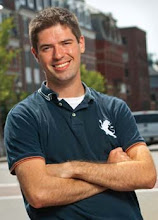Observation the First - In case you forgot it.
Observation the Second - Gertrude Stein told Hemingway that, unless one is very rich, life is a choice between art and clothing. "You can surround yourself with beautiful things, and wear plain clothing, or you can follow fashion at the expense of art. I have chosen the former."
That flashed to mind when I looked at the souvenir table. I'm usually not procliven to souvenir purchasing - je me souviens, without them - but I really liked the exhibits I saw, and they had albums for both. I need to build up the "arts" section of my library. But I had just bought shoes and a couple of t-shirts the day before, and the albums were just as expensive. I couldn't justify spending that much two days in a row. I have, however, designated April as "Book-Buying Month," so I might be back.
Observation the Third - If I were to blame the homoeroticism of the entire Stalinist regime (blame is a strong word: perhaps pin on, or accredit to...) to one individual, it would be Deineka (I'm not the only one.). He takes such delight in painting nude men or muscular men in various states of being, and his women are of three stock types:
1. the Michelangelo might-as-well-be-male with ball-boobsObservation the Fourth - I feel complicated emotions towards the other exhibit I saw, dedicated to Aleksandr Shevchenko. For most of the exhibit I was thinking, "I've seen that before, and so did he," (that is, he was following tendencies of Cubism and abstract primitivism from Western European cues). But there are some - like those below (it's really hard to find his paintings online) - that speak. They scream!
2. the grieving widow
3. the bourgeois femme fatale - pretty, but dangerous to the [Soviet] viewer.


These two ("Women on the Boulevard" and "Sleeping boy," both 1911) were next to each other, and I liked the juxtaposition, as if the curator had some Soviet anti-bourgeois tendencies - the ghastly spectres of the soul-sucking rich, versus the happy, healthy peasant.
Observation the Fifth - In most exhibitions there's some kind of order to the paintings: chronological, thematic, by subject or by medium. I have no idea how the curators at the Tretyakov establish their exhibits. There must be some reasoning, but it is scattered and incomplete, or not well expressed in the exhibit space itself.
In the Shevchenko, the best series was the above pair (plus the two paintings on either side). The viewer (I) could construct a story, or draw comparisons and conclusions. Otherwise, the organization left much to be desired - neither by medium, nor by subject nor style. I picked up on some motifs in Shevchenko's work, but only the most obvious - and not with the sense that they were motifs, but that I had seen them somewhere before...
In an ideal exhibition space, the viewer will be allowed to draw parallels, to understand creative devices or emotional expressions that are important to the artist, or to the way the curator appreciates the artist. The ideal space relates the art to the subjectivity of the curator's understanding of it. I think the problem, here, is that I'm coming to the scene with that sense that art is highly (or entirely) subjective, whereas whatever philosophy is overriding the curators' intent is that art appreciation should be objective and canonized.
Edit: Briullov beat me to the punch with a similar post, but I hadn't read his before I wrote this one. So. Nyahhhh. :P
































